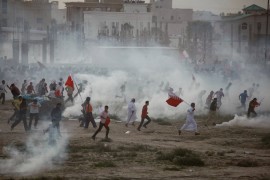A Bahraini man shouts slogans as others wave their national flag during an anti-government protest in the village of Jannusan, west of Manama, on May 9, 2014. (Photo: Mohammed al-Sheikh)
By: Abbas Bu-Safwan
Published Monday, May 12, 2014
It is still unclear if the Bahraini king’s son, Nasser bin Hamad al-Khalifa, will be put behind bars or if he will be protected by his diplomatic immunity, which has saved him in the past. The plaintiffs, armed with a long list of indictments, argue that lifting his immunity would be a step in the right direction. The verdict was issued by a British court and Spain could be the next destination, but the prince continues to remain silent.
London: Relations between the kingdoms of Britain and Bahrain are witnessing the first legal engagement in their history, although they are not yet tense. The UK Supreme Court in London ruled last Friday to lift the prohibition on publicizing the name of the Bahraini prince who is accused of torture.
There is also speculation that Bahraini authorities and the accused prince do not want to be legally accountableAfter two years of extreme secrecy, the court hearing did not need more than 20 minutes to respond to the demands of the legal team, which filed a lawsuit against the head of the Royal Guards in the Bahrain Defence Forces Prince Nasser bin Hamad bin Issa al-Khalifa, the king of Bahrain’s fourth son.
The press can now mention the prince’s name, after he was charged with several counts of torture against opponents of his father’s rule. The court will hold another hearing next October to consider whether the prince enjoys diplomatic immunity or not, and whether it prevents his arrest and trial inside the UK.
The suspected prince is the half-brother of the crown prince of Bahrain, Salman bin Hamad al-Khalifa, and heads the Royal Guard. He has held this position since June 2011, when his father promoted him to the rank of colonel and appointed him to the unit in charge with his own personal safety. This was in recognition of the prince’s tough stance against the reform movement and his outright calls for revenge against its participants.
The plaintiff, however, still refuses to reveal his identity and introduces himself as F.F.. The court had accepted his request to remain anonymous out of fear of retaliation against him and his family, knowing he had been arrested and tortured in Bahrain in the past.
The plaintiff’s lawyer, Tom Hickman, took up the entire session, which was attended by Al-Akhbar, and concurred with the British public prosecutor on the need to remove the ban on announcing Nasser’s name. This came after a long series of procedures between the court and Manama. The Bahraini government and the suspected prince were both absent from the session held in Hall 3 of the ancient church-like building.
Bahrain officially informed the court at a previous date that it does not wish to interfere in the case and would prefer to stand clear from the authority of British courts. The accused prince, however, did not submit any replies in a total boycott of the British judiciary.
Nasser could have appealed the decision to lift the ban on his name, but he failed to do so during the 22-day legal limit for an appeal that starts from the time one receives the file, according to British law.
It is likely that the Bahraini government decided to officially boycott the trial, following advice given to the authorities in Manama from the British government and western lawyers, to thwart the legal process. However, their efforts might have faced a setback when the judge agreed to publicize the name of a prince in a Gulf state, which enjoys close ties with the British Crown and the London government, for the very first time.
There is also speculation that Bahraini authorities and the accused prince do not want to be legally accountable, to prevent shedding more light on the already unstable situation in Bahrain and the widespread human right violations involving the children of the ruling family (according to human rights reports), who are in charge of the political, military, and judicial authorities in the country.
In similar circumstances, Tel Aviv cancelled visits to Britain by Israeli officials and military officers in 2010, fearing they would be arrested for war crimes in the 2008 war on Gaza.All eyes are now on next October’s session, during which a decision will be made concerning whether or not Nasser bin Hamad enjoys diplomatic immunity preventing his trial.
The case against the young prince goes back to June 2012, when a European human rights organization, in cooperation with the Bahrain Center for Human Rights (BCHR), headed by detained Bahraini human rights defender Nabeel Rajab, sent a letter to British Prime Minister David Cameron and Foreign Affairs Minister William Hague. They requested a ban on Nasser’s entry into the UK as a suspect in torturing activists in Bahrain. The letter, published by The Guardian at the time, called on the British government to take action against the prince and subject him to investigation by the public prosecution and the police war crimes team.
This coincided with London’s bid to host the 2012 Olympics. Nasser heads the Bahraini Olympic Committee, as well as the Supreme Council for Youth and Sports, which is suspected of targeting around 150 athletes, who were jailed, tortured, dismissed from their jobs, and banned from their sport. They included former Bahraini football team top scorer Alaa Hubail and his brother Mohammed.
Cameron’s government refused a request to ban the Bahraini prince from its territories, justifying its decision with the prince’s diplomatic immunity, which prevents his arrest and trial. This led to the acting president of BCHR, Maryam al-Khawaja, to accuse the Cameron government of double standards, in reference to official British efforts led by Hague to prohibit the head of the Syrian Olympic Committee General Mowafaq Joumaa from representing his country on the same day.
In reaction to these events, Bahraini citizen F.F. filed legal action at the British prosecutor in October 2012, appealing the Cameron government’s opinion that the prince enjoys diplomatic immunity.
The supreme court accepted the latest appeal, but decided to postpone consideration of the case, allowing the two defendants (Bahrain and the suspected prince) the opportunity to respond to the charges, undergo an investigation, and cooperate with the court, to which the reply was negative.
The plaintiff’s legal team maintained that Nasser “did not enjoy any kind of immunity when he was beaten up by politicians during the state of emergency in Bahrain between March and May 2011, but the British government believes he has immunity.”
In the event the criminal court decides that the king’s spoiled son does not enjoy immunity, this would pave the way for the consideration of cases where he is suspected of beating, kicking, and insulting jailed opponents, in addition to issuing orders to arrest and torture athletes. This occurred after the forced dispersal of Pearl Roundabout and the violent campaign against the popular movement by Bahraini authorities, propped up by the Saudis and Emiratis.
Additionally, if the judge decides that the defendant does not enjoy immunity, this would apply to all of Europe and not merely the UK and paves the way for lawsuits against Nasser in other European countries.
Diplomatic immunity, which the British authorities claim Nasser bin Hamad enjoys, provides some sort of legal immunity. The 1961 Vienna Convention [on Diplomatic Relations] ensures that diplomats are not prosecuted or subjected to trial in a host country.
The plaintiff, F.F., must submit his evidence 21 days prior to the October session. The British government, on the other hand, needs to submit its defense 14 days prior to the session, which will decide on the possibility of the second step to consider the allegations against the son’s king.
Nasser bin Hamad is accused of torturing Mohammed Habib al-Mokdad, a member of the Bahraini opposition with Swedish nationality and who had been sentenced by Bahraini courts to a total of 96 years in prison in various rulings.The plaintiff’s legal team hopes “a repeat of former Chilean dictator [Augusto] Pinochet’s scenario, who was taken into custody in 2002 in Britain, based on a warrant by a Spanish judge.” Pinochet remained in London under house arrest for more than one year, before being discharged for medical reasons.
In similar circumstances, Tel Aviv cancelled visits to Britain by Israeli officials and military officers in 2010, fearing they would be arrested for war crimes in the 2008 war on Gaza. Under the 1988 criminal justice act, courts in England and the UK had the power to issue arrest warrants in response to petitions by civil associations against war crime suspects anywhere in the world.
However, the law was amended by the former Labor government led by Gordon Brown, limiting the powers of the judiciary in prosecuting war crimes. This came following pressure exerted against London by countries like Israel, which commit systematic rights violations. The amendment required warrants to arrest suspects in international crimes, such as those under the Geneva conventions, to obtain prior agreement from the public prosecutor.
It is still unclear whether prince Nasser will accompany his father in his visit to Britain this weekend, as part of a massive PR campaign led by the Bahraini king in Europe, who will be visiting the Vatican. This comes after last year’s focus on Asia.
In all cases, it seems the position of the king’s son is under serious scrutiny, following public comments on Bahraini television, where he threatened those who call for his father’s overthrow with revenge and promoted a violent rhetoric against peaceful protesters at Pearl Roundabout.
His extreme stance has damaged the prince’s image in the West, in addition to his political future. However, it made him more popular with the hardline elements of the regime, who believe that Crown Prince Salman is too conciliatory towards opponents of the monarchy.
Regardless of the results of the October session, the head of Americans for Democracy and Human Rights in Bahrain Hussein Abdullah, who was attending the trial, commented on lifting the ban on publicizing Nasser’s identity. He believed this sends “a message to victims of torture that those responsible for their suffering will be held accountable and that Nasser and his likes will pay the price, according to the law.” He also expressed optimism that the judge will decide that “Nasser does not enjoy immunity,” indicating that Spain could be the next country where litigation will be initiated against whom he called violators of human rights in Bahrain.
“The spoiled prince” carried out torture
Nasser bin Hamad is accused of torturing Mohammed Habib al-Mokdad, a member of the Bahraini opposition with Swedish nationality and who had been sentenced by Bahraini courts to a total of 96 years in prison in various rulings.
Mokdad is one of three people who have accused the prince of torturing them. The other two are Abdullah al-Mahrous and 67-year-old Mohammed Hassan Jawad, who is currently serving 15 years in prison for conspiring to overthrow the regime.
Amnesty International has doubted the efficacy of Bahraini courts and said that the recent decisions are politically motivated and do not meet the standard for fair trials. It also classified Mokdad and other leaders arrested on March 17, 2011 as prisoners of conscience.
http://english.al-akhbar.com/content/bahraini-prince-could-be-tried-torture-britain




